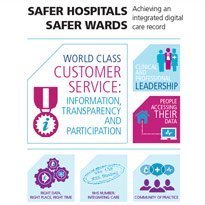Three IDCR exemplars named
- 29 January 2014

NHS England has announced the three exemplars in digital care record integration, and confirmed that the next round of the ‘Safer Hospitals, Safer Wards: Technology Fund’ will focus on integrated care.
A paper presented to the commissioning board last week says Cumbria, Bradford and Bristol will all receive funding from the first round of the tech fund "to create integrated digital care records across care settings."
The same paper says that the second round of tech fund will launch in early February and focus on integrated care records between health and social care.
Dr William Lumb, a GP and chief clinical information officer for NHS Cumbria, told EHI Cumbria had received funding for three different projects.
These include ongoing work to share GP and community records with out-of-hours providers via Healthcare Gateway’s Medical Interoperability Gateway and to implement a Strata Health region-wide resource matching and e-referral system.
The third project involves Cumbria Partnership NHS Foundation Trust, which has just gone out to tender for an electronic patient record system that will form a “fundamental building block for a common platform for information sharing across all organisational boundaries.”
Dr Lumb said Cumbria had received £500,000 over two years for the MIG project and matching and e-referral system; known locally as an ‘air traffic control’ system for health. Cumbria has been working on the projects for a couple of years, but finances have been tight.
“This means we will move further quicker. The money will bring things further than they already have,” said Dr Lumb.
The project to share information through the MIG first went live in Carlisle in 2011. It is now being rolled out across Cumbria.
“I’d say the MIG project is between a third and a half deployed, but that changes on a weekly basis. There are technical issues that need resolving and other providers are coming on board; we’re taking to the ambulance service about joining them up at the moment,” said Dr Lumb. “When we talk about connecting everyone with everything, that’s a big project.”
The matching and e-referral system is in its early stages of deployment. The first go-live of the system, which integrates with the electronic patient record systems in use in acute, mental health and community providers and with GP systems, took place in February last year.
A tender document says that Cumbria Partnership NHS Foundation is looking for an electronic patient record and a portal to cover services including community care, mental health and learning disabilities and children’s services. It also wants to introduce electronic prescribing.
“The trust requires an integration engine (portal) that will interface with trust systems to enable the presentation of a single EPR,” it says.
“The portal must be capable of providing the means to enable the interfacing between third party software and other systems. Most importantly the portal must enable the transfer and sharing of data / information.”
The tech fund was launched in mid-20013, to support health secretary Jeremy Hunt’s vision of a ‘paperless’ NHS. Bidding for the first round of money took place last year.
The NHS England paper says that £218m was awarded to 234 projects; although these have not all been announced, and other figures have been given. All funding must be matched by the NHS trusts.




